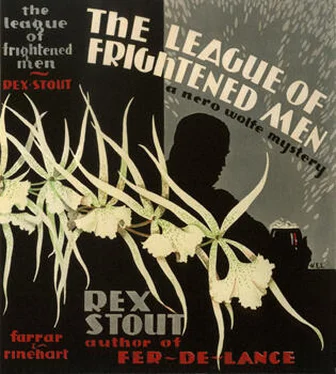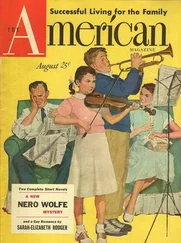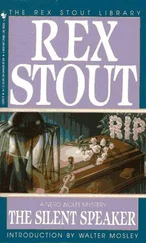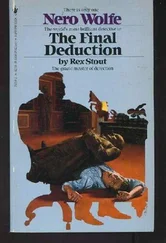“No one. That’s all. My daughter left around half past six, a little before Dora came. Of course I don’t understand — what is it, Alice?”
A door had opened behind me, and I turned to see. It was the woman, the old friend. She said:
“Nick Cabot is on the phone — they notified him. He wants to know if you want to talk to him.”
Mrs. Burton’s dark eyes flashed aside for an instant, at me. I let my head go sideways enough for her to see it. She spoke to her friend, “No, there is nothing to say. I won’t talk to anyone. Are you folks finding something to eat?”
“We’ll make out. Really, Anne, I think—”
“Please, Alice. Please—”
After a pause the door closed again. I had a grin inside, a little cocky. I said, “You started to say, something you don’t understand...”
She didn’t go on. She sat looking at me with a frown in her eyes but her brow smooth and white. She got up and went to a table, took a cigarette from a box and lit it, and picked up an ash tray. She came back to the couch and sat down and took a couple of whiffs. Then she looked at the cigarette as if wondering where it had come from, and crushed it dead on the tray, and set the tray down. She straightened up and seemed to remember I was looking at her. She spoke suddenly:
“What did you say your name is?”
“Archie Goodwin.”
“Thank you. I should know your name. Strange things can happen, can’t they? Why did you tell me not to talk to Mr. Cabot?”
“No special reason. Right now I don’t want you to be talking to anybody but me.”
She nodded. “And I’m doing it. Mr. Goodwin, you’re not much over half my age and I never saw you before. You seem to be clever. You realized, I suppose, what the shock of seeing my husband dead, shot dead, has done to me. It has shaken things loose. I am doing something very remarkable, for me. I don’t usually talk, below the surface. I never have, since childhood, except with two people. My husband, my dear husband, and Paul Chapin. But we aren’t talking about my husband, there’s nothing to say about him. He’s dead. He is dead... I shall have to tell myself many times... he is dead. He wants to go on living in me, or I want him to. I think — this is what I am really saying — I think I would want Paul to.—Oh, it’s impossible!” She jerked herself up, and her hands got clasped again. “It’s absurd to try to talk about this — even to a stranger — and with Lorrie dead — absurd...”
I said, “Maybe it’s absurd not to. Let it crack open once, spill it out.”
She shook her head. “There’s nothing to crack open. There’s no reason why I should want to talk about it, but I do. Otherwise why should I let you question me? I saw farther inside myself this evening than I have ever seen before. It wasn’t when I saw my husband dead, it wasn’t when I stood alone in my room, looking at a picture of him, trying to realize he was dead. It was sitting here with that police inspector, with him telling me that a plea of guilty is not accepted in first degree murder, and that I would have to talk with a representative of the District Attorney, and would have to testify in court so that Paul Chapin can be convicted and punished. I don’t want him punished. My husband is dead, isn’t that enough? And if I don’t want him punished, what is it I want to hold onto? Is it pity? I have never pitied him. I have been pretty insolent with life, but not insolent enough to pity Paul Chapin. You told me that he has a box filled with my gloves and stockings which Dora stole for him, and that Nero Wolfe said it holds his soul. Perhaps my soul has been put away in a box too, and I didn’t even know it...”
She got up, abruptly. The ash tray slid off the couch to the floor. She stooped over, and with deliberate fingers that showed no sign of trembling picked up the burnt match stick and the cigarette and put them on the tray. I didn’t move to help her. She went to the table with the tray and then came back to the couch and sat down again. She said:
“I have always disliked Paul Chapin. Once, when I was eighteen years old, I promised to marry him. When I learned of his accident, that he was crippled for life, I was delighted because I wouldn’t have to keep my promise. I didn’t know that then but I realized it later. At no time have I pitied him. I claim no originality in that, I think no woman has ever pitied him, only men. Women do not like him — even those who have been briefly fascinated by him. I dislike him intensely. I have thought about this; I have had occasion to analyze it; it is his deformity that is intolerable. Not his physical deformity. The deformity of his nervous system, of his brain. You have heard of feminine cunning, but you don’t understand it as Paul does, for he has it himself. It is a hateful quality in a man. Women have been fascinated by it, but the two or three who surrendered to it — I not among them, not even at eighteen — got only contempt for a reward.
“He married Dora Ritter. She’s a woman?”
“Oh yes, Dora’s a woman. But she is consecrated to a denial of her womanhood. I am fond of her, I understand her. She knows what beauty is, and she sees herself. That forced her, long ago, to the denial, and her strength of will has maintained it. Paul understood her too. He married her to show his contempt for me; he told me so. He could risk it with Dora because she might be relied upon never to embarrass him with the only demand that he would find humiliating. And as for Dora — she hates him, but she would die for him. Fiercely and secretly, against her denial, she longed for the dignity of marriage, and it was a miracle of luck that Paul offered it under the only circumstances that could make it acceptable to her. Oh, they understand each other!”
I said, “She hates him, and she married him.”
“Yes. Dora could do that.”
“I’m surprised she was here today. I understood she had a bad accident Wednesday morning. I saw her. She seems to have some character.”
“It could be called that. Dora is insane. Legally, I suppose not, but nevertheless she is insane. Paul has told her so many times. She tells me about it, in the same tone she uses for the weather. There are two things she can’t bear the thought of: that any woman should suspect her of being capable of tenderness, or that any man should regard her as a woman at all. Her character comes from her indifference to everything else, except Paul Chapin.”
“She bragged to Nero Wolfe that she was married.”
“Of course. It removes her from the field.—Oh, it is impossible to laugh at her, and you can’t pity her any more than you can Paul. A monkey might as well pity me because I haven’t got a tail.”
I said, “You were talking about your soul.”
“Was I? Yes. To you, Mr. Goodwin. I could not speak about it to my friend, Alice — I tried but nothing came. Wasn’t I saying that I don’t want Paul Chapin punished? Perhaps that’s wrong, perhaps I do want him punished, but not crudely by killing him. What have I in my mind? What is in my heart? God knows. But I started to answer your questions when you said something — something about his punishment—”
I nodded. “I said he shouldn’t get more than is coming to him. Of course to you it looks open and shut, and apparently it looks the same way to the cops. You heard shots and ran to the foyer and there it was, a live man and a dead man and a gun. And of course Inspector Cramer has already got the other fixings, for instance the motive all dressed up and its shoes shined, not to mention a willingness to even up with Chapin for certain inconveniences he has been put to. But as Nero Wolfe says, a nurse that pushes the perambulator in the park without putting the baby in it has missed the point. Maybe if I look around I’ll find the baby. For example, Dora Chapin left here at seven-twenty. Chapin arrived at seven-thirty, ten minutes later. What if she waited in the hall outside and came back in with him? Or if she couldn’t do that because the maid let him in, he could have opened the door for her while the maid was gone to tell Dr. Burton. She could have snatched the gun from Burton’s pocket and done the shooting and beat it before you could get there. That might explain the light being out; she might have flipped the switch before she opened the outer door so if anyone happened to be passing in the outside hall they couldn’t see in. You say she hates Chapin. Maybe to him it was entirely unexpected, he had no idea what she was up to—”
Читать дальше












